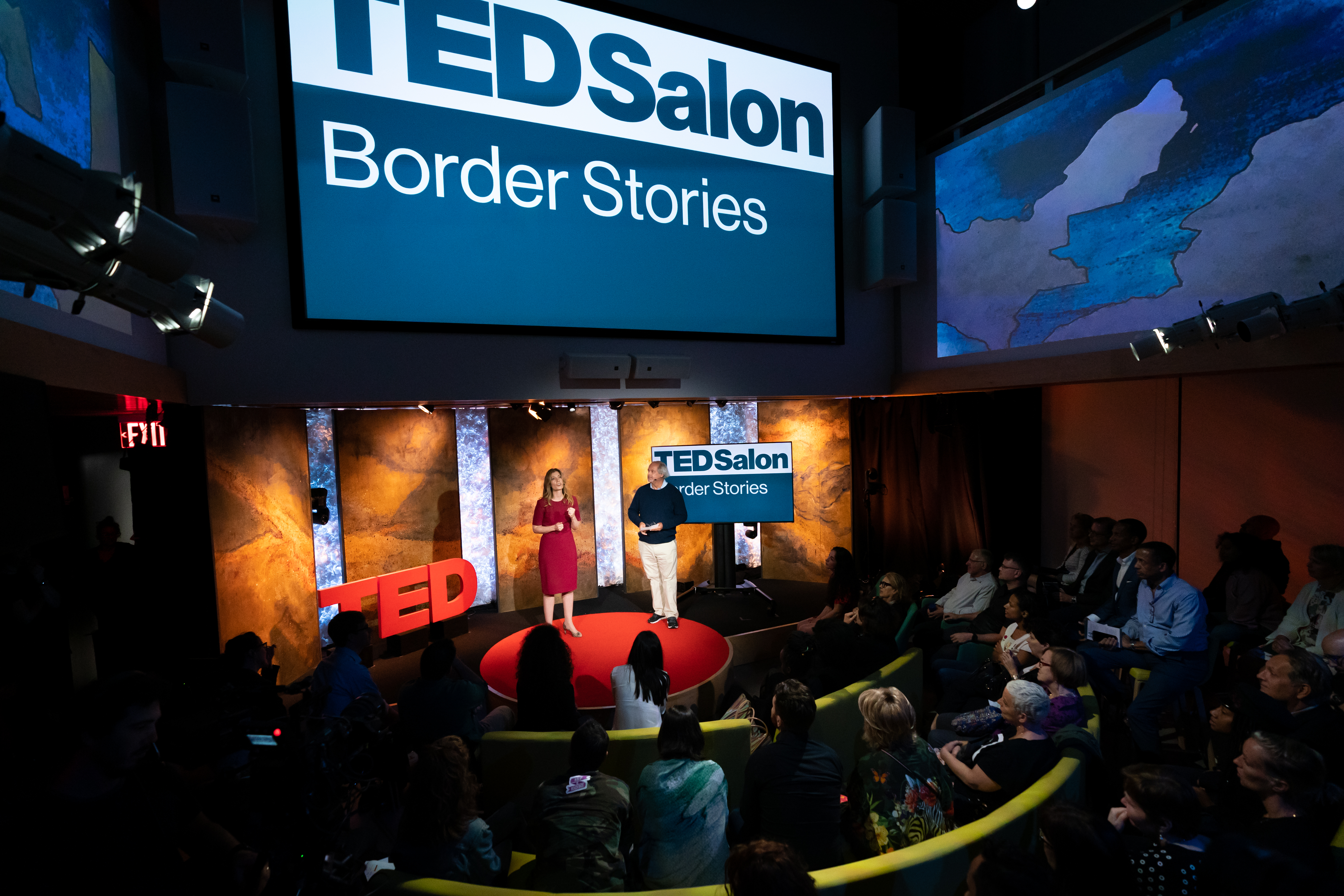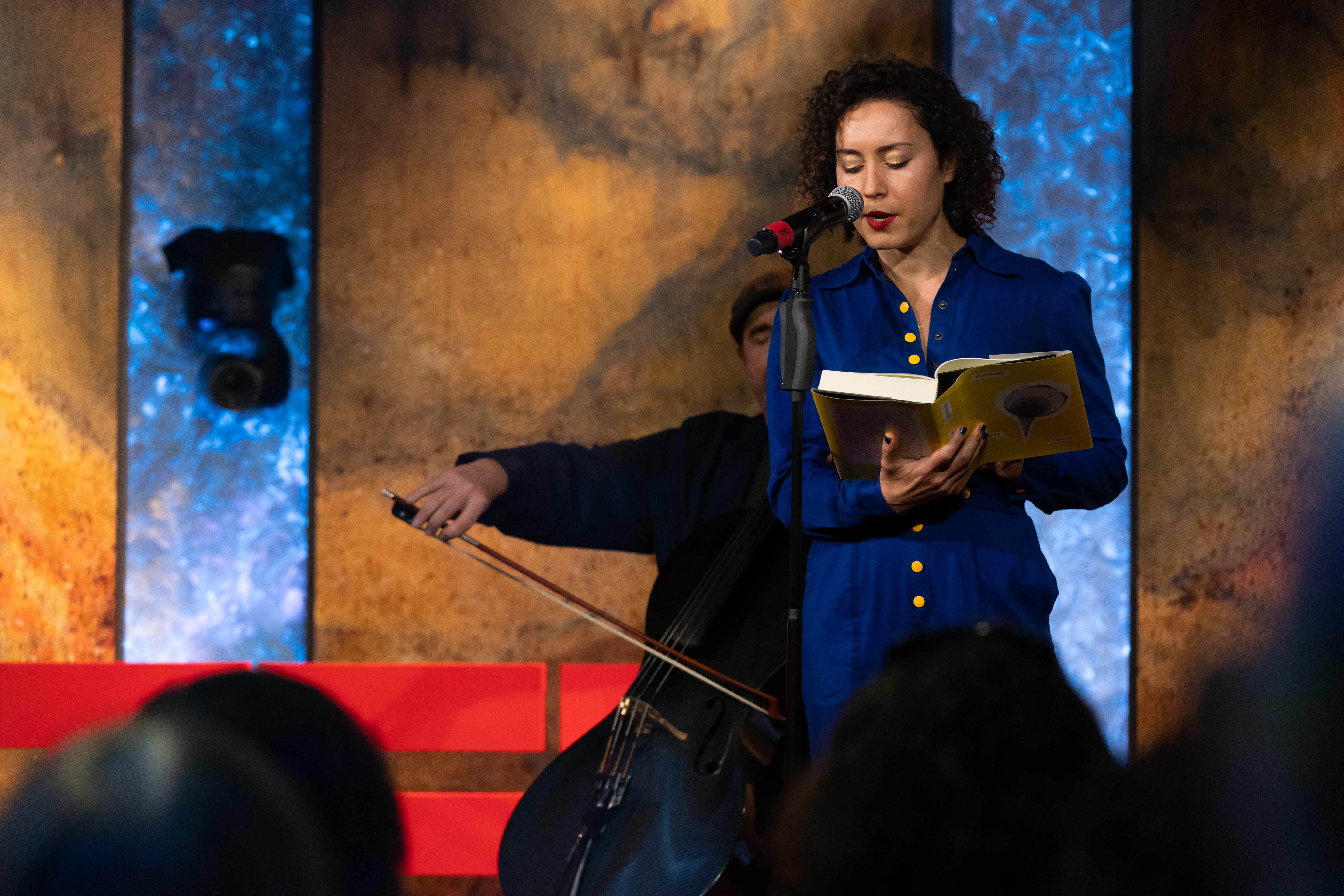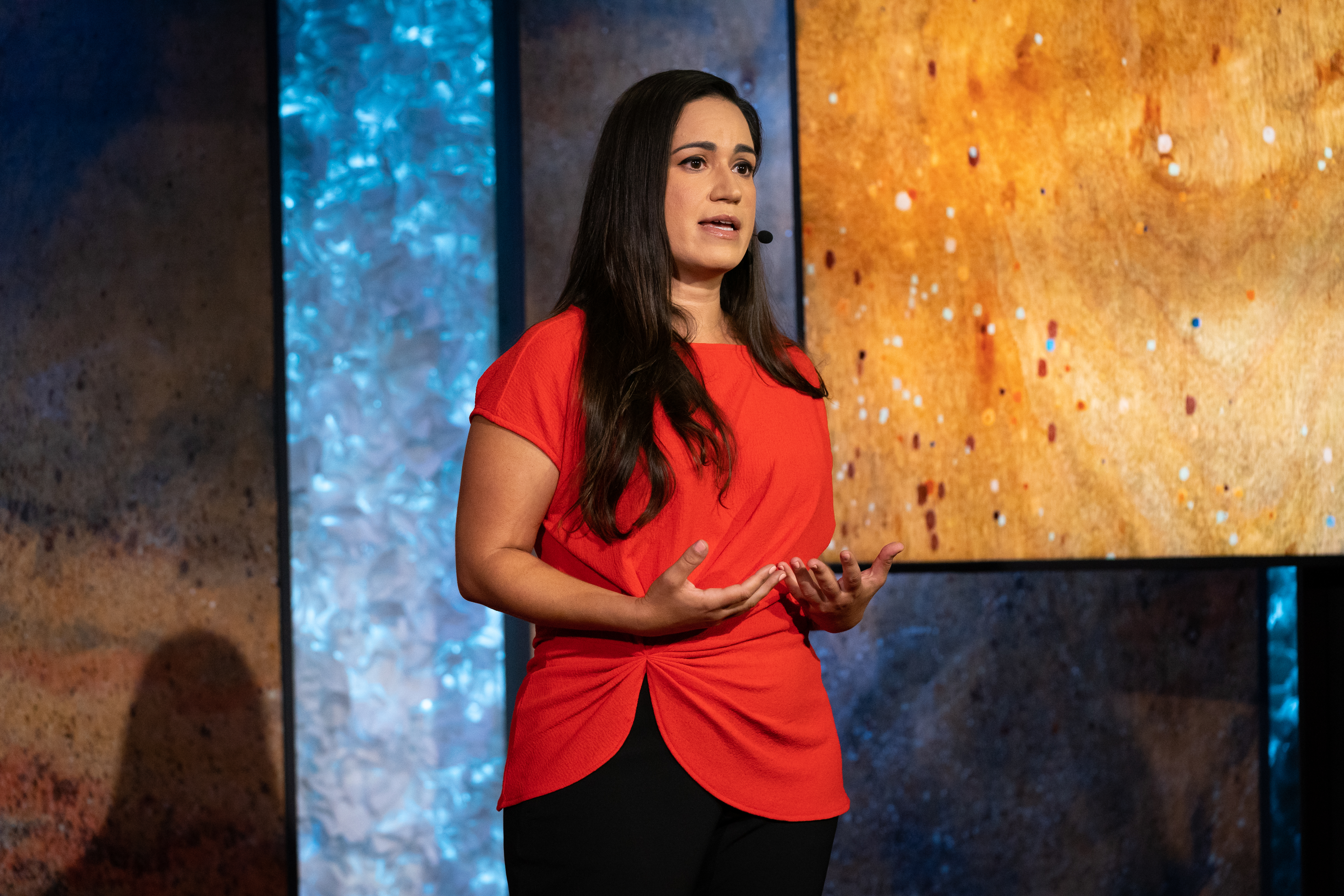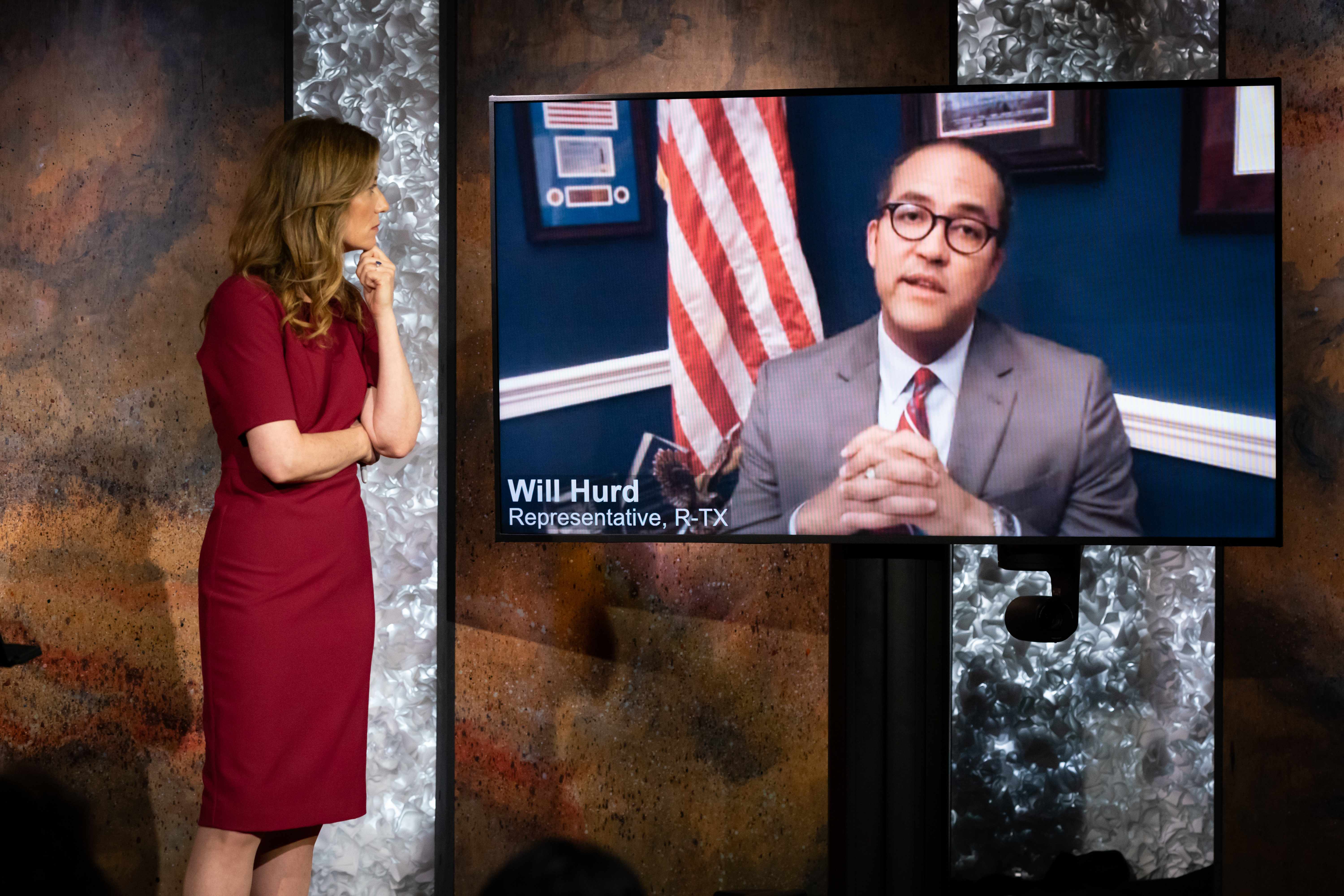
Hosts Anne Milgram and Juan Enriquez kick off the evening at TED Salon: Border Stories at the TED World Theater in New York City on September 10, 2019. (Photo: Ryan Lash / TED)
Immigration can be a deeply polarizing topic. But at heart, immigration policies and practices reflect no less than our attitude towards humanity. At TED Salon: Border Stories, we explored the reality of life at the US-Mexico border, the history of the US immigration policy and possible solutions for reform — and investigated what’s truly at stake.
The event: TED Salon: Border Stories, hosted by criminal justice reformer Anne Milgram and author and academic Juan Enriquez
When and where: Tuesday, September 10, 2019, at the TED World Theater in New York City
Speakers: Paul A. Kramer, Luis H. Zayas, Erika Pinheiro, David J. Bier and Will Hurd
Music: From Morley and Martha Redbone
A special performance: Poet and thinker Maria Popova, reading an excerpt from her book Figuring. A stunning meditation on “the illusion of separateness, of otherness” — and on “the infinitely many kinds of beautiful lives” that inhabit this universe — accompanied by cellist Dave Eggar and guitarist Chris Bruce.

“There are infinitely many kinds of beautiful lives,” says Maria Popova, reading a selection of her work at TED Salon: Border Stories. (Photo: Ryan Lash / TED)
The talks in brief:
Paul A. Kramer, historian, writer, professor of history
- Big idea: It’s time we make the immigration conversation to reflect how the world really works.
- How? We must rid ourselves of the outdated questions, born from nativist and nationalist sentiments, that have permeated the immigration debate for centuries: interrogations of usefulness and assimilation, of parasitic rhetoric aimed at dismantling any positive discussions around immigration. What gives these damaging queries traction and power, Kramer says, is how they tap into a seemingly harmless sense of national belonging — and ultimately activate, heighten and inflame it. Kramer maps out a way for us to redraw those mental, societal and political borders and give immigrants access to the rights and resources that their work, activism and home countries have already played a fundamental role in creating.
- Quote of the talk: “[We need] to redraw the boundaries of who counts — whose life, whose rights and whose thriving matters. We need to redraw … the borders of us.”
Luis H. Zayas, social worker, psychologist, researcher
- Big idea: Asylum seekers — especially children — face traumatizing conditions at the US-Mexico border. We need compassionate, humane practices that give them the care they need during arduous times.
- Why? Under prolonged and intense stress, the young developing brain is harmed — plain and simple, says Luis H. Zayas. He details the distressing conditions immigrant families face on their way to the US, which have only escalated since children started being separated from their parents and held in detention centers. He urges the US to reframe its practices, replacing hostility and fear with safety and compassion. For instance: the US could open processing centers, where immigrants can find the support they need to start a new life. These facilities would be community-oriented, offering medical care, social support and the fundamental human right to respectful and dignified treatment.
- Quote of the talk: “I hope we can agree on one thing: that none of us wants to look back at this moment in our history when we knew we were inflicting lifelong trauma on children, and that we sat back and did nothing. That would be the greatest tragedy of all.”

Immigration lawyer Erika Pinheiro discusses the hidden realities of the US immigration system. “Seeing these horrors day in and day out has changed me,” she says. (Photo: Ryan Lash / TED)
Erika Pinheiro, nonprofit litigation and policy director
- Big idea: The current US administration’s mass separations of asylum-seeking families at the Mexican border shocked the conscience of the world — and the cruel realities of the immigration system have only gotten worse. We need a legal and social reckoning.
- How? US immigration laws are broken, says Erika Pinheiro. Since 2017, US attorneys general have made sweeping changes to asylum law to ensure fewer people qualify for protection in the US. This includes all types of people fleeing persecution: Venezuelan activists, Russian dissidents, Chinese Muslims, climate change refugees — the list goes on. The US has simultaneously created a parallel legal system where migrants are detained indefinitely, often without access to legal help. Pinheiro issues a call to action: if you are against the cruel and inhumane treatment of migrants, then you need to get involved. You need to demand that your lawmakers expand the definition of refugees and amend laws to ensure immigrants have access to counsel and independent courts. Failing to act now threatens the inherent dignity of all humans.
- Quote of the talk: “History shows us that the first population to be vilified and stripped of their rights is rarely the last.”
David J. Bier, immigration policy analyst
- Big idea: We can solve the border crisis in a humane fashion. In fact, we’ve done so before.
- How? Most migrants who travel illegally from Central America to the US do so because they have no way to enter the US legally. When these immigrants are caught, they find themselves in the grips of a cruel system of incarceration and dehumanization — but is inhumane treatment really necessary to protect our borders? Bier points us to the example of Mexican guest worker programs, which allow immigrants to cross borders and work the jobs they need to support their families. As legal opportunities to cross the border have increased, the number of illegal Mexican immigrants seized at the border has plummeted 98 percent. If we were to extend guest worker programs to Central Americans as well, Bier says, we could see a similar drop in the numbers of illegal immigrants.
- Quote of the talk: “This belief that the only way to maintain order is with inhumane means is inaccurate — and, in fact, the opposite is true. Only a humane system will create order at the border.”

“Building a 30-foot-high concrete structure from sea to shining sea is the most expensive and least effective way to do border security,” says Congressman Will Hurd in a video interview with Anne Milgram at TED Salon: Border Stories. (Photo: Ryan Lash / TED)
Will Hurd, US Representative for Texas’s 23rd congressional district
- Big idea: Walls won’t solve our problems.
- Why? Representing a massive district that encompasses 29 counties and two times zones and shares an 820-mile border with Mexico, Republican Congressman Will Hurd has a frontline perspective on illegal immigration in Texas. Legal immigration options and modernizing the Border Patrol (which still measures their response times to border incidents in hours and days) will be what ultimately stems the tide of illegal border crossings, Hurd says. Instead of investing in walls and separating families, the US should invest in their own defense forces — and, on the other side of the border, work to alleviate poverty and violence in Central American countries.
- Quote of the talk: “When you’re debating your strategy, if somebody comes up with the idea of snatching a child out of their mother’s arms, you need to go back to the drawing board. This is not what the United States of America stands for. This is not a Republican or a Democrat or an Independent thing. This is a human decency thing.”
Juan Enriquez, author and academic
- Big idea: If the US continues to divide groups of people into “us” and “them,” we open the door to inhumanity and atrocity — and not just at our borders.
- How? Countries that survive and grow as the years go by are compassionate, kind, smart and brave; countries that don’t govern by cruelty and fear, says Juan Enriquez. In a personal talk, he calls on us to realize that deportation, imprisonment and dehumanization aren’t isolated phenomena directed at people crossing the border illegally but instead things are happening to the people who live and work by our sides in our communities. Now is the time to stand up and do something to stop our country’s slide into fear and division — whether it’s engaging in small acts of humanity, loud protests in the streets or activism directed at enacting legislative or policy changes.
- Quote of the talk: “This is how you wipe out an economy. This isn’t about kids and borders, it’s about us. This is about who we are, who we the people are, as a nation and as individuals. This is not an abstract debate.”